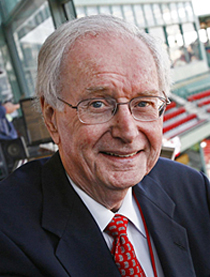
Culture
Age is the great equalizer. It puts us all in the same boat. No matter what advantage of fleetness of foot or of brute strength we may have possessed in our salad days, the aging process catches up with everyone in the end.

Flavin
Professional athletes are different from the rest of us. They are gifted with superior speed, strength, reflexes, and hand/eye coordination. Those things set them apart from the great majority of us. However, as time goes by, those differences become less and less noticeable. It's not that we who are left behind increase our abilities to outrun and to outmuscle everyone else; it's that, with the passage of time and advancing age, those who have been blessed with those gifts lose them; they eventually fade away.
Age is the great equalizer. It puts us all in the same boat. No matter what advantage of fleetness of foot or of brute strength we may have possessed in our salad days, the aging process catches up with everyone in the end. It makes no difference if we could get around on a 98 mile-an-hour fastball back in the day or not, we all become the same. We all get old, and there's not a thing we can do about it.
Athletic ability is reserved for the young, and it doesn't last forever.
Johnny Bench of the Cincinnati Reds, widely regarded as the greatest catcher of all time, was given athletic ability in abundance. Baseball came naturally to him. Before he was old enough to vote, he was a National League all-star and had won the first of 10 consecutive Gold Glove awards. Yet, as the years went by, he found that he had to work harder and harder just to keep his skills at the same level they had been when he first broke into the big leagues and everything had come so naturally to him. He loved the game as much as ever, but it had become work and not just fun to play. He's 74 now, and just like the rest of us, facing mortality.
Wilt Chamberlain seemed as close to Superman as one could get during his playing days. His combination of skill and size made him virtually unstoppable. One year, he averaged more than 50 points per game. But that didn't help him any when his heart failed, causing his death in 1999.
John Havlicek was like the eveready bunny; woe be to the man who had to guard him during an NBA game. Havlicek would run him into the ground. He never stopped running for an entire game and never seemed to wear down. He was perpetual motion personified. Yet I noticed one year at the annual fishing tournament he hosted on behalf of The Genesis Foundation that he seemed to have slowed down from previous years. The next year, his movements became even slower. It turned out that he had been diagnosed with Parkinson's disease and his condition became progressively worse until taking his life in 2019, shortly after his 79th birthday.
Ted Williams, a dedicated fisherman in his post-playing days, was up before dawn every day to fix himself a hearty breakfast before going out on the water in search of the elusive bonefish in the Florida Keys or the fighting salmon along the banks of the Miramichi River in Brunswick, Canada. He'd spend his evenings tying flies, which took great manual dexterity and attention to detail. In the afternoon, he could be found as a regular on the tennis court. Then he'd be back at it again the next day. He drank only moderately. He lived the same way until his mid-70s when the strokes started to hit him. At first, they affected his vision so that he had to get the news from television instead of reading books, newspapers, and periodicals but, in the end, he was a total invalid who needed help just to feed himself. He died in 2002 at the age of 83.
The sight of the incomparable Bill Russell, who needed a walker, plus the aid of Bobby Orr and Tedy Bruschi just to make his way from the dugout to the pitchers' mound prior to throwing out the first ball of the 2016 Red Sox season was a stark reminder that even the greatest of us are not immune to age's inevitability.
The point is that the gifts that make some people great athletes only last a few years. In the final analysis, they are just as vulnerable to the vagaries of old age and failing health as the rest of us. Some, like Bobby Doerr, last a long time. He was forced into retirement in 1951 by a chronic bad back. After several years of resting it, though, the back returned to normal and he lived until passing away in November of 2017 at the age of 99. He lived to be older than any other Hall of Fame member in history. There's no telling when our time will come, but it's coming, and there's not a thing any of us -- not even the greatest of stars -- can do about it.
There are two things in addition to talent that athletes need to achieve greatness: one is good health and the other is the will to be great. We have all seen "can't miss" prospects who never fulfilled their promise, sometimes through no fault of their own: a pitcher with a sore arm; a running back who breaks a leg. There are other examples who have no one to blame but themselves -- guys who think they can do it on talent alone. It takes dedication, even for the very gifted. Local bars are populated by guys who thought they could make the bigtime without putting in the work. It seldom if ever works out for them. The competition is too tough. Somewhere out there is someone who could have been as great as Tom Brady but didn't have the fire in his belly to make it happen. His friends probably say, "You shoulda seen him when he was younger. There was nothing he couldn't do." But it's always said with a tone of wistfulness, because there was something he could have done. He could have applied himself with the same dedication of a Johnny Bench, a John Havlicek, or even a Ted Williams, who once said that his sole ambition in life was to have people say of him, "There goes Ted Williams. The greatest hitter who ever lived."
- Dick Flavin is a New York Times bestselling author; the Boston Red Sox "Poet Laureate" and The Pilot's recently minted Sports' columnist.
Recent articles in the Culture & Events section
-
Scripture Reflection for April 28, 2024, Fifth Sunday of EasterDeacon Greg Kandra
-
Boston and the nation respond to the San Francisco Earthquake of 1906Thomas Lester
-
See you in the storyLaura Kelly Fanucci
-
'Dignitas' and the mediaRussell Shaw
-
Scripture Reflection for April 14, 2024, Third Sunday of EasterDeacon Greg Kandra


















